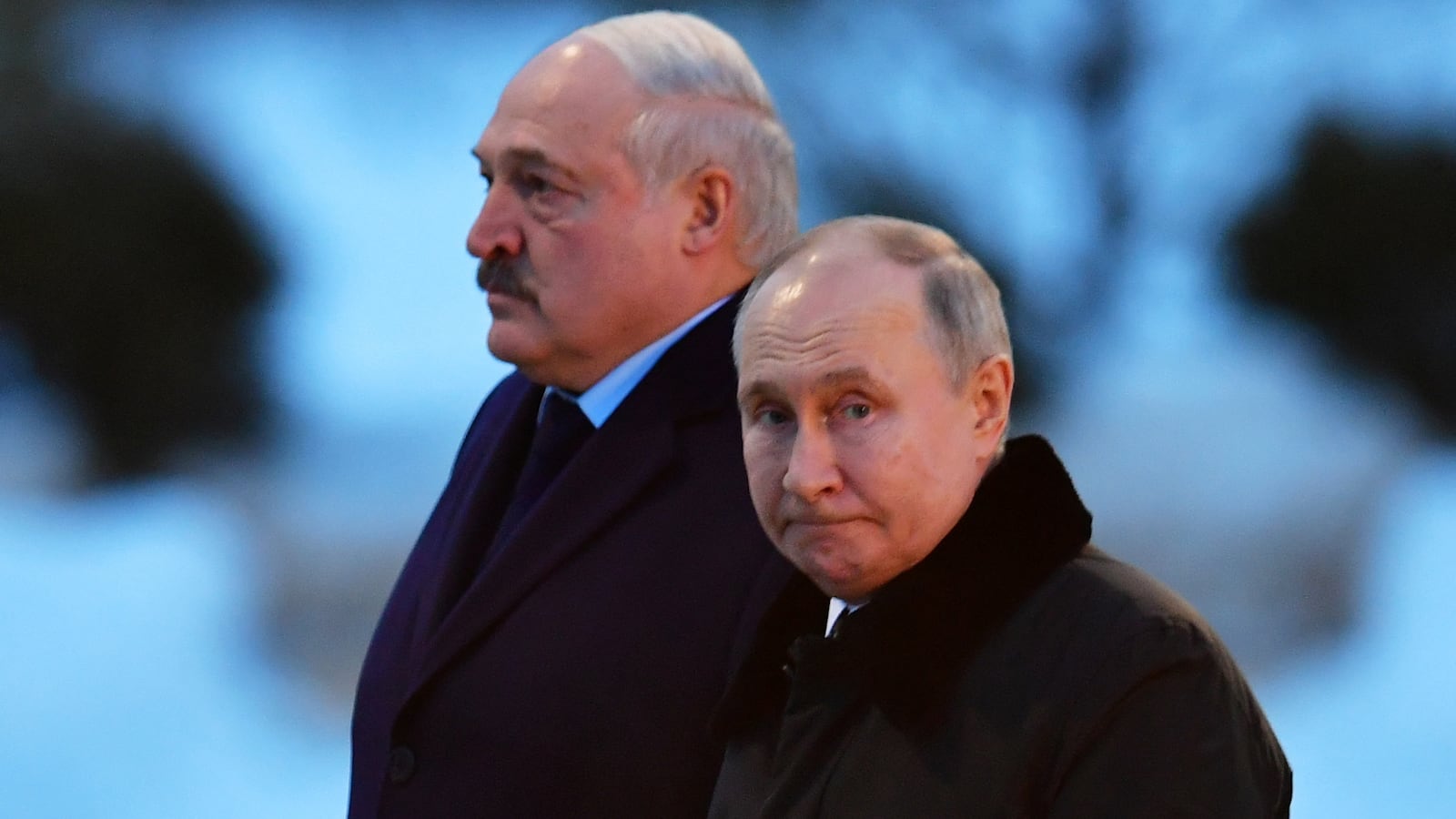Belarusian President Alexander Lukashenko on Tuesday appears to have blown a massive hole in Vladimir Putin’s claims that Ukraine may have been behind the horrific terror attack at a concert venue on the outskirts of Moscow last week.
ISIS has claimed responsibility for the massacre Friday at the Crocus City Hall in which 139 people were killed. Nevertheless, Putin has attempted to shift blame for the bloodshed to Kyiv— but a major claim that the Russian president cited as evidence of potential Ukrainian involvement has now been utterly contradicted by none other than his most ardent ally.
Even after the radical Islamists claimed to be behind the attack, Putin did not mention them in his first national address about the incident on Saturday. Instead, he said that four of the attackers were arrested as they fled in the direction of Ukraine, adding that a “window was prepared for them from the Ukrainian side” to cross the border.
But Lukashenko, speaking to reporters Tuesday, appeared to suggest that the only reason the attackers headed in the direction of the Ukrainian border was because they couldn’t get into Belarus due to increased security measures implemented after the attack, which included checkpoints being set up on roads between Russia and Belarus and the deployment of several military units.
“That’s why there was no chance they could enter Belarus. They realized it,” Lukashenko said, according to the Belarusian state-owned BelTA news agency. “So they took a turn and headed to the Ukraine-Russia border.”
“They could not enter Belarus,” Lukashenko added. “Their handlers (we have suspicions about some of them, I’ll call Putin and share my suspicions) knew that it would be a very bad idea to try to enter Belarus, because Belarus immediately reinforced security measures, just like a part of the oblast in Russia.”
Lukashenko also said that when he and Putin were informed that the car carrying the perpetrators was moving in the direction of Bryansk, the pair agreed that Belarus would seal off its section of a road that could have been used by the attackers to escape and Russia would do the same with its section of the same road.
The Belarusian leader went on to explain that he was sharing this contradictory information, bizarrely, to stick up for Putin. “Why have I said this? Because this self-exiled opposition (theirs and ours) began to reproach Putin: ‘Why is he not addressing the nation?’ In fact, Putin and I did not sleep for 24 hours!” Lukashenko said. “What would they know about this? We kept in touch all the time. When it was time to address the nation, he did it.”
Following that first address, Putin has continued pushing claims of Kyiv’s involvement. He did not publicly acknowledge that Islamic militants were responsible for the attack until Monday—though he still tried to blame Ukraine.
“We know that the crime was carried out by radical Islamists,” he said, but implied the killing could have been part of a larger anti-Russian conspiracy centered in Kyiv. “The question that arises is who benefits from this?” Putin said, according to Reuters. “This atrocity may be just a link in a whole series of attempts by those who have been at war with our country since 2014 by the hands of the neo-Nazi Kyiv regime.”
The Russian president went on to claim that the point of the attack was to “sow panic,” while also showing the Ukrainian people “that not all is lost for the Kyiv regime.”
Alexander Bortnikov, the director of Russia’s Federal Security Service (FSB), doubled-down on the allegations on Tuesday, claiming that Ukrainian and other intelligence agencies had been involved. “We believe that the action was prepared both by the radical Islamists themselves and, naturally, by Western intelligence services,” Bortnikov said, according to RIA Novosti. “The Ukrainian intelligence services themselves are directly related to this.”
He added that the “bandits intended to go abroad specifically to the territory of Ukraine” and that preliminary information showed the attackers “were expected there.” “I’ll tell you a little secret: they wanted to be greeted as heroes on the other side,” Bortnikov said.
Kremlin spokesman Dmitry Peskov was asked Tuesday why the Kremlin believes radical Islamists would collaborate with the government of Ukraine, particularly given that its leader Volodymyr Zelensky is Jewish. Peskov answered that such a collaboration could be possible because Zelensky is a “peculiar Jew,” according to Russian state media. “A Jew who in many ways shows sympathy and inclination towards the nationalist spirit that permeated the leadership of the Kyiv regime,” he added.
Kyiv has repeatedly denied any type of involvement in the terror attack. In his nightly address Monday, Zelensky called Putin a “sick and cynical creature.” “Everyone is a terrorist to him, except for himself,” he said.







